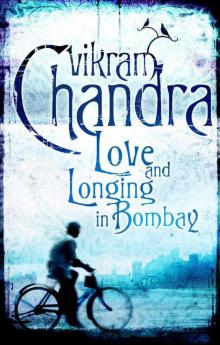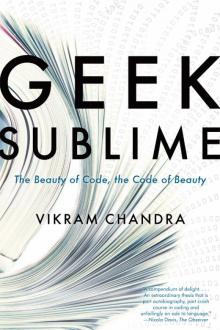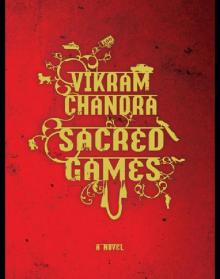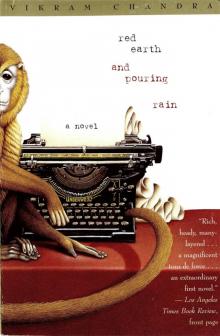- Home
- Vikram Chandra
Sacred Games Page 8
Sacred Games Read online
Page 8
I laughed, and knew my teeth had bared. ‘No, you don’t. Not even a little bit. But still you might help.’
An auto-rickshaw going the other way slowed and came curvetting across the road towards us. The woman took hold of the iron bar above its meter before it stopped, and swung herself into the seat. ‘Go,’ she said to the driver.
‘Paritosh Shah,’ I said, hunching my shoulders and leaning forward into the rickshaw. Now I had her attention.
‘What about him?’
‘I need to find him.’
‘You need to?’
‘Yes.’
She slipped forward on the seat, and gave me fully the blank threat of her gaze. ‘You look too dirty to be a khabari. They try to look clean and trustworthy.’
‘I’m not,’ I said. ‘I wouldn’t know who to inform to.’
‘Get in,’ she said. She made room on the cracked red rexine, gave instructions to the auto-rickshaw driver and we went put-putting away through unfamiliar lanes. The buildings came closer to each other now, jammed together wall against wall, and the streets were close with people who stepped aside for the auto to pass. I peered out on the left, and then through the oval window in the canvas at the rear.
‘Calm down,’ the woman said. ‘You’re safe. If I wanted to harm you, that big ghoda in your pants wouldn’t save you.’
I looked down. I had been holding the revolver through stained blue cloth. I let go of it and massaged my right hand with the other. ‘I’ve never been here before,’ I said.
‘I know,’ she said. She leaned over to me. ‘What’s your name?’
‘My name is Ganesh. And yours?’
‘I am Kanta Bai. What do you have for Paritosh Shah?’
I said, close to her ear, ‘I have gold.’ I came closer. ‘Biscuits.’
‘Be quiet, Ganesh, until we get out of the auto.’
The auto stopped on a busy bazaar square full of wholesale clothing shops, and she led me through rapid turns in narrowing lanes. She was known well here, and people passing greeted her by name, but she hurried by without a pause. At the end of a lane there was a wall with a break in it, a jagged hole lined with shattered bricks, and on the other side there was a basti. I watched my feet and followed her rapid walk. The shacks were closer now, and in some places the pucca buildings were so close to each other across the lane that it was like walking through a tunnel. Men and women and children stood aside to let Kanta Bai pass. There were boys, young men, sitting on ledges and in doorways and I felt their eyes on my neck, and I kept my back straight and kept close to Kanta Bai.
I smelt the overpowering round richness of gur first, and then the vomit. We turned right and passed by a low doorway, and I saw metal tables, and men sitting around them drinking. A boy put a plate with two boiled eggs down on the table nearest the entrance, and his customer shook out the last milky drops from a glass into his mouth. Kanta Bai angled around the side of the building, and the whine of an electric turbine deepened its pitch. She left me in a dark room filled to the ceiling with sacks of gur. ‘Wait here,’ she said, and so I waited. The warm smell settled on my shoulders, brown as river-bottom earth. Through the unceasing grind of the motor I could hear the highest notes from a radio in the front room, the bar, just the tinny tops of the song, coming to me like froth, and I wondered about the quality of Kanta Bai’s product. There had been customers enough, maybe twenty on a work-day afternoon, sipping steadily at the eight and ten-rupee glasses of saadi and satrangi they distilled in the back. It was a good business, raw materials cheap and legally available, overheads low. And the demand for good desi liquor was steady and constant, as continuous and vast as the tramp of feet in the lanes outside. I leaned forward and through the curtained doorway I could see just the bare feet of Kanta Bai’s workers and the dragging bottoms of sacks, and occasionally the round gleam of bottles. I recognized her sari, and so was able to turn away and be standing at the furthest end of the room when she turned aside the curtain. When I saw her eyes, burning white despite the sloughy darkness of the gur sacks, I was afraid.
‘I spoke to Paritosh Shah on the phone,’ she said.
I was unable to speak, buried by the abrupt terror of being alone, inexperienced, alone with gold. I nodded, and in the same motion leaned my shoulder against the doorway, very casual. I put a hand on my hip and nodded again.
Kanta Bai was faintly amused. A very small ripple of pleasure passed through her jaw, and she said, ‘Let’s see your gold.’
I nodded. I was still very unsafe, queasy inside, but this was necessary. I groped in my right pocket, moved the bars to my left hand, and held them out, two of them weighty in my palm.
Kanta Bai took the bars, tested their heft and weight, and gave them back to me. Her eyes were steady on my face. ‘He’ll see you now. I’ll have one of my boys take you.’
‘Good,’ I said, now able to find my voice and confidence. The biscuits went back to my pocket, and I fumbled out a thin roll of notes, and fanned them out.
‘You can’t pay me.’
‘What?’
‘How much do you have?’
I turned my hand to the side, to the light. ‘Thirty-nine rupees.’
At this she gurgled out a laugh, and her cheeks bunched and her eyes squeezed almost shut. ‘Bachcha, go and meet Paritosh Shah. He’ll owe me a favour if things go well. Thirty-nine rupees doesn’t make you Raja Bhoj of Bumbai.’
‘I’ll owe a favour, too,’ I said. ‘If things go well.’
‘Very smart,’ she said. ‘Maybe you’re a good boy after all.’
Paritosh Shah was a family man. I waited for him on a second-floor hallway, near a staircase that exhaled occasional blasts of sharp urine-stink. The building was six storeys tall and ancient, with a bamboo framework roped and nailed to its tottering façade, and worrisome gaps in the ornate scrollwork on the balconies. The second floor was full of male Shahs, who passed by where Kanta Bai’s boy had left me on the landing, and they called each other Chachu and Mamu and Bhai, and ignored me entirely. They walked by my dirty shirt and ragged trousers with the barest of glances. They were a flashy, gold-ringed lot who wore mostly white safari suits. I could see their white shoes and white chappals lined up in untidy rows near the uniformed guard at the door. Somewhere inside was the sanctum of Paritosh Shah, guarded by a hoary old muchchad perched on a stool with an absurdly long-barrelled shotgun. He wore a blue uniform with yellow braid, and his moustache was enormous and curved at the ends. After twenty minutes of passing Shahs and piss-stench, I was starting to feel quite insulted, and somehow my resentment focused itself on the ammunition belt the old man wore around his chest, on its cracked leather and three cylindrical red cartridges. I imagined pulling my revolver and putting a hole in the centre of the ammunition belt, just above the saggy stomach. It was an absurd thought, but there was satisfaction in it.
Ten minutes more went by, and that was enough. It was either now or the bullet to his chest. I had a pulsing headache. ‘Listen, mamu,’ I said to the guard, who was now investigating his left ear with a pencil stub. ‘Tell Paritosh Shah I came to do business, not to stand out here and smell his latrine.’
‘What?’ The pencil came out. ‘What?’
‘Tell Paritosh Shah I’m gone. Gone elsewhere. His loss.’
‘Wait, wait.’ The old man leaned back and pointed his moustachios through the doorway. ‘Badriya, come and see what this fellow is saying.’
Badriya came, and he was younger by much, and very tall, a quiet-moving muscle-builder, with a deliberate padding way about him in his bare feet. He stood in the doorway with his arms hanging away from his chest, and I was sure he had a weapon tucked away in the small of his back, under the black bush-shirt. ‘Is there a problem?’
It was a challenge, no question about it, and the man was blank-faced and hard, but I was riding now on the thin-drawn craziness of the moment, on the exhaustion from the long day and the bracing leap of anger. ‘Yes, problem,’ I said. ‘I’m ti
red of waiting for your maderchod Paritosh Shah.’
The old man bristled and started to climb down from his stool, but Badriya spoke quietly. ‘He’s a busy man.’
‘So am I.’
‘Are you?’
‘I am.’
And that was all it took. The guard had panic in his shoulders. His grip on the shotgun was clumsy, far up the stock, and with one leg on the ground and the other on a cross-bar of the stool he was tilted wrong and unbalanced. I watched him and I watched Badriya. It was absurd to be near death in a sudden moment in a grimy corridor with nostrils full, unreasonable to be almost moneyed and not yet, ludicrous to be Ganesh Gaitonde, poor in the city and standing to the side always, there was no sense in any of it and so there was an exulting eagerness in me, a glad and crazy courage. Here. Now. Here I am. What of it?
Badriya raised his left hand slowly. ‘All right,’ he said. ‘I’ll go and see if he’s free now.’
I shrugged. ‘Okay,’ I said, liking the English word, one of the very few I knew then. ‘Okay. I’ll wait.’ I grinned at the muchchad for the next few minutes, frightening the old man more and more, setting his hands trembling on the shotgun. By the time Badriya appeared again, I was sure I could stare the ancient soldier and his martial whiskers straight into a heart attack. But there was business to be done.
‘Come,’ Badriya said, and I pulled off my shoes and followed. The annexe led into a warren of hallways lined with identical black doors. ‘Raise your arms,’ Badriya said. I nodded, and raised the front of my shirt, and sucked in my stomach as Badriya gently took up my revolver. Badriya gave it a professional flip back-and-forth of the wrist, looking along its barrel. He raised it to his nose, intent. He was barrel-chested, heavy-necked. ‘Been fired not too long ago,’ he said.
‘Yes,’ I said.
Badriya reversed the revolver in his hand, and although I couldn’t tell quite how it was done, it was a very stylish move. ‘Turn around,’ Badriya said. He patted me down quickly, with a series of fluttering taps under my arms and up my thighs, and no more than a very slight pause on the bars in the pockets. It was professionally done, no animosity, and I thought better of Paritosh Shah for having Badriya on his team. ‘Last door on the left,’ Badriya said with the last pat.
Paritosh Shah was lying on his side on a white gadda, propped up on a round pillow. The room was quite bare, panelled brown walls, smooth and shiny, with frosted white glass high up near the ceiling, all of it air-conditioned to a chill that I found instantly painful. There was a tidy row of three black phones next to the gadda. Paritosh Shah was very relaxed, and he raised a languid hand at a low stool. ‘Sit,’ he said. I sat, aware of Badriya behind and to the left, and the small click of the black door as it shut. ‘You’re the boy,’ Paritosh Shah said. He wasn’t very old himself, maybe six, seven, at most ten years older than I was, but he had an air of tremendous and weary confidence. ‘Name?’ he said, and somehow his limp drape on the soft gadda, his one leg bent under, his stillness, all of it warned, don’t try and fool me, boy.
‘Ganesh.’
‘You’re a rash lad, Ganesh. Ganesh what?’
‘Ganesh Gaitonde.’
‘You’re not a Bombay original. Ganesh Gaitonde from where?’
‘Doesn’t matter.’ I leaned back and brought out two bars. I laid them side by side on the edge of Paritosh Shah’s gadda.
‘You could’ve tried selling those to any Marwari jeweller. Why come to me?’
‘I want a fair price. And I can get you more.’
‘How much more?’
‘Many more. If I get fair price for these.’
Paritosh Shah tilted, toppling upright like a child’s doll with a weight in the bottom. I saw then that he had thin arms and shoulders, but a round ball of a stomach that he folded his hands over. ‘Fifty-gram biscuits. If they check out, seven thousand rupees each.’
‘Market price is fifteen thousand for fifty grams.’
‘That’s the market price. This is why gold gets smuggled.’
‘Below half is too much below. Thirteen thousand.’
‘Ten. That’s as much as I can do.’
‘Twelve.’
‘Eleven.’
I nodded. ‘Done.’
Paritosh Shah whispered into one of the black phones, and with his free hand he held out a silver box filled with silver-flecked paan and supari and elaichi. I shook my head. Money is what I wanted, money to hold and grasp, money in my pocket, I wanted thick wads of notes, the thickness enough for silver boxes, for soft gaddas and red bedspreads and record players and clean bathrooms and love, enough crisp paper for confidence and safety and life. My mouth was dry. I gripped my hands together tightly, and held them hard against each other through the discreet knock on the door, and then as it shut and Badriya put down a small scale and two stacks of currency, one fat and one thin.
‘Just to check,’ Paritosh Shah said. And he picked up the bars one by one, by the fingertips, and laid them on the scale against precise little weights. ‘Fine.’ He smiled. ‘Very fine.’ He was looking at me expectantly. The money lay on the gadda, and I moved my will like a vibrating steel spring and stilled myself and showed no sign of noticing it until Paritosh Shah stretched out slim fingers to slide the stack forward two inches. So I took it, with a hand that shook only slightly.
I stood up. The room swayed, the frosty oblongs of white light dipped into my eyes and there was a blinking flash of white sky, no horizon.
Then Paritosh Shah said, ‘You don’t talk very much.’
‘I’ll talk more next time.’ Badriya had the door open, and the corridor was long, and I emerged from it with my cash in my pocket and dizziness tamped firmly down. I bent over easily to pull on my shoes, and when I came up I had the thin curl of thirty-nine rupees in my left hand. I tucked it behind the old guard’s ammunition belt, put it in firmly with an extra little polishing motion on the leather. ‘Here, mamu,’ I said. ‘And next time I come, don’t keep me standing outside.’
The man stuttered, and Badriya laughed out loud. He held out the revolver, and raised an eyebrow. ‘You kept one gold bar back.’
I checked my chambers with a quick motion of my wrist, crisp as I could make it. ‘That one’s not for sale,’ I said.
‘Why?’
I laid away the revolver, and raised a hand in farewell. ‘Not everything is.’ On the street outside, I was still very alert. I stood in front of a Bata store and watched the glass on the shoe display, looking for lurkers. The chances were high that I was being followed, that Paritosh Shah had made his swift calculations and sent out someone, perhaps Badriya, to shadow and discover, to uncover much gold. It was only logical. But no reflected pursuers appeared, and I left the window and wandered, ambling slowly and pausing often behind blind corners to watch the faces that passed. I was ready but relaxed, at home in these city streets like I had never been. I felt a lordly compassion for the pretty little bungalows I was walking by now, lit up in the soft evening twilight, for the happy, rich children I could see running in and out. None of it was alien now. And I tried hard to resist comfort, to keep alive the sharp edge of distrust against the euphoria of a profitable deal, the ecstasy of flinging out into the world one throw of dice that rolled fluently to the inevitable condition of victory. Don’t be careless. Watch, watch. The numbers fell right but the board moves. What is white will be black. Climb high and fast and the long snakes lie waiting. Play the game.
I stood in front of a temple. I looked left and right and had no idea of how I had got there. There were apartment buildings on one side of the road, lower constructions on the other, the sloping tiled roofs of mill workers, shipping clerks, postmen. The temple stood at a corner, and it must have been the reverberating pealing of the bell that had drawn me to the courtyard, under the high saffron peak of its roof. I leant on a pillar and checked again for followers, for lethal shadows amidst the auto-rickshaws and Ambassadors. If they were out there, smelling of malice and greed, the
temple was as good a place as any to wait them out. I had no use for temples, I despised incense and comfortable lies and piety, I did not believe in gods or goddesses, but here was a haven. I took off my shoes and went in. The worshippers sat cross-legged on the smooth floor, crowded together through the length of the long hall. The walls were an austere white, lit up by tube-lights, but the dark heads swayed in a field of bright saris, purple and shining green and blue and deep red, all the way to the orange statue of Hanuman flying, suavely holding the mountain above his head. I found a place against the back wall and sat, instantly comfortable with my feet tucked in under. A man in saffron robes sat on a dais in front of Hanuman, and his discourse came easily and strongly to me, that old story about Bali and Sugreev, the conflict, the challenge, the duel, with the ambushing god waiting in the woods. I knew the turns and tricks well, and I nodded along with the old action and the rhythms of the lesson. When the priest recited couplets, holding out both his arms, the congregation chanted behind him and the women’s voices rose high in the hall. The arrow flew and Bali lay writhing on the ground, pierced, his heels scraping the forest floor, and I raised my knees and rested my head on them, and I was comfortable.
I awoke to the shaking of the saffron-robed priest. ‘Beta,’ he said, ‘time to go home.’ He had white hair and an impish face. ‘Time for lock-up here. Hanuman-ji has to go to sleep.’
I rubbed the crick from my neck, hard. ‘Yes. I’ll go.’ I was the last one in the hall.
‘Hanuman-ji understands. You were tired. Worked long. He sees everything.’
‘Sure,’ I said. What fantastic stories the old and the weak tell to each other, I thought. I stretched out my legs, stood and stumbled to the locked donation box in front of Hanuman. Peeling off a five-hundred-rupee note from the thinner wad, I remembered that I hadn’t counted the notes when Paritosh Shah had given them. Amateur-like and not to be done again. I slipped the money into the slit, and found the priest ready to my right with a thali full of prasad. I held out my cupped right hand, and ate the small sugary peda on the way out. My mouth flooded painfully with saliva, and I was rested, and life was very sweet.

 Love and Longing in Bombay
Love and Longing in Bombay Geek Sublime
Geek Sublime Sacred Games
Sacred Games Red Earth and Pouring Rain
Red Earth and Pouring Rain